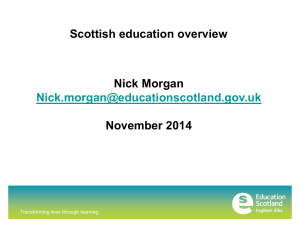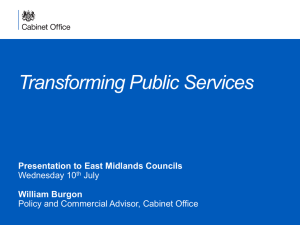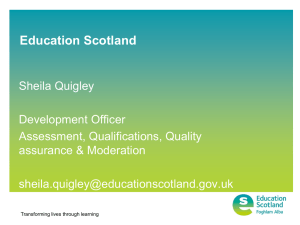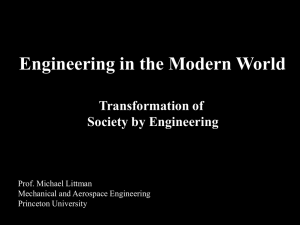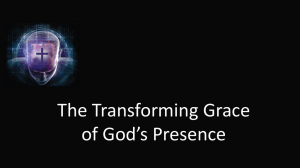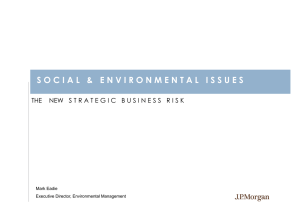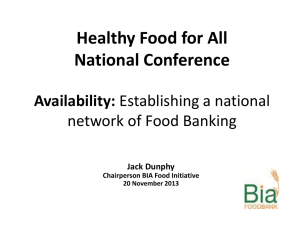Last Minute Market
advertisement
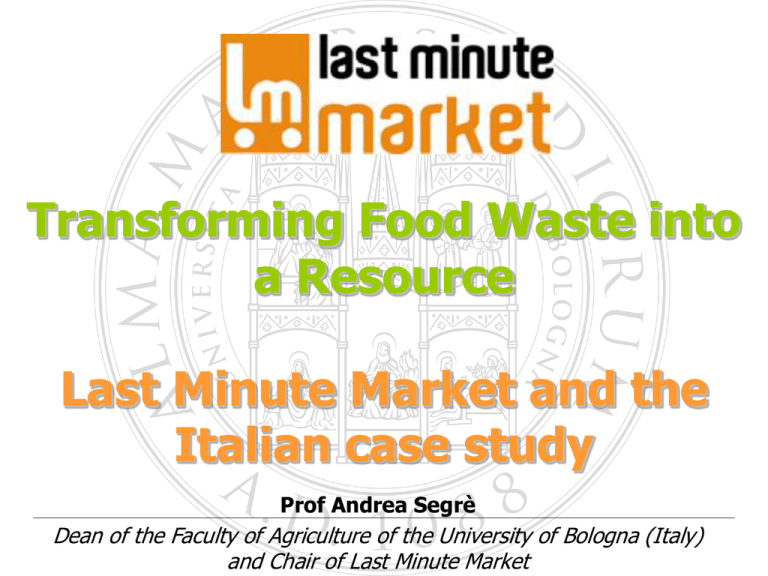
Transforming Food Waste into a Resource Last Minute Market and the Italian case study Prof Andrea Segrè Dean of the Faculty of Agriculture of the University of Bologna (Italy) and Chair of Last Minute Market HUNGER AND OVERNUTRITION • FAO estimates that the global agricultural production could feed 12 billion people (the double of the current world population) • The World Food Summit in 2009 has called for a 70% increasement in the agricultural production by 2050 to meet the food demand of a growing population BUT while 935 million are hungry, 300 million people are obese and 1 billion people are overweight. Food surplus would be enough to feed 3 billion people (Stuart: Uncovering the global food scandal, 2009) • HUNGER and OVERNUTRITION are strictly connected both in developed and developing countries. • The Millennium Development Goals were established in 2000 to halve the number of starving people by 2015…but the data are still shocking LAST MINUTE MARKET – TRANSFORMING WASTE INTO RESOURCE The paradox FOOD INSECURITY vs WASTE WHILE MILLIONS ARE STARVING….. US: American families buy more food than what the family members consume. On an average expenditure of $ 42 on food, $ 14 are spent on unnecessary products. UK: 30 and 40% of the food production is wasted every year for a value of £ 16 billion. The food waste amounts to 1/3 of all the waste produced in Britain. 250,000 people every day could benefit from the wasted food. Italy: 20 million tons of food are wasted from the field to the supermarket (source: Italian Food Waste Report 2010) More data will be presented in the course of the conference! LAST MINUTE MARKET – TRANSFORMING WASTE INTO RESOURCE FOOD WASTE IN ITALYData from the Italian Food Waste Report 2010 Food waste originates along the whole supply chain IN ITALY Waste in the fields: in 2009, 3.25% (17.700.586 t) of agricultural production in Italy remained in the fields Waste at the producers’ organizations level : in 2008/09 almost 81,000 tons of fruits and vegetables were withdrawn from the market, of which only 6.13% was not wasted. Waste in the agroindustry: in 2009 food waste stood at around 2.2%. (2.161.312 t) Waste at retailers level: in 2009 food waste stood at 1,2%. (244.252 t) TOTAL 20.290.767 t Every year we waste an amount of food that could meet the food requirements of 3/4 of the Italian population (44.472.914 people). The economic value of the food waste is EUR 37 billion or 3% of our GDP. Dumping food waste in a landfill causes environmental damage. By volume, it is the largest contributor to methane gas production. LAST MINUTE MARKET – TRANSFORMING WASTE INTO RESOURCE Food Waste vs Food Surplus At the same time we accumulate surpluses Reasons for food surplus - Structural agricultural surpluses (CAP) - Defects/changing/damages in packaging - Residues of promotional activities - Seasonal products - Non-compliance with the typical physical standards - Cessation of the business activities - Close to the expiry date - Launch of a new product - Errors in production planning LAST MINUTE MARKET – TRANSFORMING WASTE INTO RESOURCE LAST MINUTE MARKET Last Minute Market benefits poor people and people in need. Our aim: not a single minute or product should be wasted—it s a “last minute” action! A growing number of people in developed countries require emergency food assistance – they do not have access to enough food. For a variety of reasons, the same developed economies produce a growing quantity of FOOD SURPLUS. In Italy 13.6 million people live with less than 1300 euro per month. LAST MINUTE MARKET – TRANSFORMING WASTE INTO RESOURCE LAST MINUTE MARKET Profit vs Non Profit FOOD SURPLUS ↓ For profit companies (firms, processing industries, food shops, supermarkets…) it represents a COST (transport and destruction of the products) ↓ For the civil society it represents a NEGATIVE EXTERNALITY (environmental pollution). ↓ For charities and non profit institutions it is an OPPORTUNITY (more food). LMM is the link between profit (the supply) and non profit (the demand) LAST MINUTE MARKET – TRANSFORMING WASTE INTO RESOURCE LAST MINUTE MARKET Waste: Market Failure, Inefficiency, Gift Demand (-) Food waste is a market failure Supply (-) Poor people - charity org. Surplus - business They demand Products not for sale GIFT They need Products safe to eat They can’t buy- no money No price Speak the “no profit language” Speak the “business language” LAST MINUTE MARKET – TRANSFORMING WASTE INTO RESOURCE LAST MINUTE MARKET Win-Win Strategy For profit companies Public administration Win-Win Charity organizations It provides economic, social and environmental benefits by reducing the amount of waste and improving assistance to people in need. LAST MINUTE MARKET – TRANSFORMING WASTE INTO RESOURCE LAST MINUTE MARKET Stakeholders’ benefits Companies - Reduced disposal costs - Fiscal benefits - Better logistics - Increase visibility in the territory Charities - Constant supply - Free food - Reinvestment of the savings - Better assistance Public Administration - Reduce products in landfill - Better quality assistance - Ability to grant discounts - Better management of funds Society - Minor negative externalities - Education (do not waste!!) -“Ethical" behavior - Reciprocity LAST MINUTE MARKET – TRANSFORMING WASTE INTO RESOURCE LAST MINUTE MARKET NOT ONLY FOOD LAST MINUTE MARKET NON FOOD FOOD BOOK HARVEST SEEDS PHARMACY LAST MINUTE MARKET – TRANSFORMING WASTE INTO RESOURCE LAST MINUTE MARKET If LMM were adopted in all Italy… Stores’ Typology Cash and Carry shops Superstores Supermarkets Small shops TOTAL Expected quantities of recuperated food per year 4.644 tonnes 67.467 tonnes 128.785 tonnes 43.357 tonnes 244.252 tonnes VALUE OF RECUPERATED FOOD CO2 emissions 928.157.600 euro = 580.402.025 meals in a year 291.393 tonnes of CO2 are produced because the food end up in landfills LAST MINUTE MARKET – TRANSFORMING WASTE INTO RESOURCE LAST MINUTE MARKET Achievements Last Minute Market’s achievements are: •the commercial success of the donor companies •a contribution to sustainable development (a better management of economic, social and environmental resources) •an important reduction in CO2 emissions •a contribution to education on lifestyles, consumption •benefits to the people helped by the charities (better and more nutritional food) •the charities can invest the money they would have spent on food for other purposes LAST MINUTE MARKET – TRANSFORMING WASTE INTO RESOURCE LAST MINUTE MARKET LMM combines solidariety with environmental sustainability. At the same time it enhances strong community actions and promotes networking activities. Thank you! www.lastminutemarket.it andrea.segre@unibo.it LAST MINUTE MARKET – TRANSFORMING WASTE INTO RESOURCE
